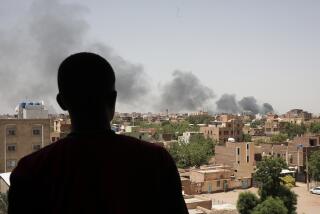Refugees Clash With Serbs, Peacekeepers
TUZLA, Bosnia-Herzegovina — An escalating confrontation over the right of Muslim refugees to return to homes in Serb-held territory turned deadly Monday in the most violent ethnic clashes since the war in Bosnia ended five months ago.
Serbs wielding shovels and sticks attacked buses of Muslims attempting to reach the town of Trnovo south of Sarajevo, while other Muslims went up against Serbs--and NATO-led peacekeepers--blocking them from entering the northern city of Doboj.
Impatient Muslim civilians intent on visiting their homes and family cemeteries finally charged around a NATO checkpoint outside Serb-held Doboj and into a minefield. At least two were killed--one by a land mine and the other apparently shot by Serbs, NATO spokesman U.S. Army Col. Mark Brzozowski said in Tuzla. At least seven more were wounded.
Sarajevo government television reported that one woman was killed and 18 people were injured in the Trnovo confrontation. The casualty figures could not be confirmed independently.
Under the U.S.-brokered Dayton, Ohio, peace accord, refugees are to be allowed to return to the villages from which they were expelled by their ethnic rivals during the war in Bosnia-Herzegovina, which began four years ago. Muslims especially have attempted to force the issue in recent days by staging large returns that have invariably been met by angry, volatile crowds of Serbs.
Local authorities on both sides are instigating the crowds rather than attempting to make the returns go smoothly, NATO and U.N. officials say.
The North Atlantic Treaty Organization blocks the returns rather than facilitating them, in what it says is an effort to avoid wider violence. At issue, NATO representatives say, is a conflict between the freedom of movement enshrined at Dayton and the overall peace. For now, freedom of movement and the right of refugees to go home are being sacrificed to maintain order, the officials say.
Attempts to disperse the often-armed crowds would draw NATO troops into the control of civil unrest, a task for which they are neither mandated nor trained, NATO officials say.
“We have to maintain freedom of movement . . . [but] we are more concerned, in the short term, about organized demonstrations that provoke violent reactions and jeopardize the peace process,” NATO spokesman British Maj. Simon Haselock said in Sarajevo.
For Muslims and Serbs, the issue goes directly to whether Bosnia is one country, as the Dayton accord asserts and the Muslims want, or two separate states, which the Serbs want and the reality on the ground tends to confirm.
Most of the attempted returns cross an ethnic boundary line drawn by the Dayton accord that was intended to mark territory but not serve as a border. Bosnian Serbs, especially, have chosen to regard the boundary as a border and prohibit crossings. Their NATO-aided success in preventing recent returns only solidifies the dividing line, analysts here say.
*
In Monday’s violence near Doboj, at the village of Sjenina, two platoons of Swedish soldiers and U.N. police stood between the estimated 100 Muslims and 25 Serbs, halting the Muslims. Muslims have been warned by NATO-led troops against entering Serb-held villages in large numbers without Serbian approval because of threats to their safety.
In earlier attempted returns, U.S. troops in armored personnel carriers have roped off the routes Muslims were attempting to cross, allowing some to proceed on foot but turning back the majority.
In both of Monday’s incidents, the several hundred Muslims involved said they were trying to visit the graves of dead relatives as part of the celebration of Bajram, an Islamic holiday. After the Trnovo clash, the frustrated refugees returned to Sarajevo and rallied outside the offices of High Representative Carl Bildt, the international community’s senior official in charge of implementing civilian aspects of the Dayton accord, such as refugee returns.
All sides have blocked homecomings by their ethnic rivals, but most obstruction has come from the Serbs because most attempts have been made by Muslims. The majority of Bosnia’s 2 million displaced people are Muslims, victims of the Bosnian Serbs’ program of “ethnic cleansing,” a systematic campaign to rid Bosnia of non-Serbs.
More to Read
Sign up for Essential California
The most important California stories and recommendations in your inbox every morning.
You may occasionally receive promotional content from the Los Angeles Times.











